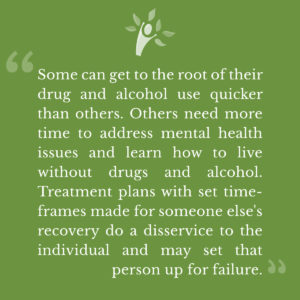
Mainstream treatment options for substance addiction vary significantly in duration, services offered, program focus, cost and projected outcomes. Durations can range from as little as 72 hours and to well over a year. Shorter stays generally yield a higher frequency of relapse. Longer stays, using a holistic treatment protocol, coupled with long-term outpatient addiction treatment programs, provide individualized treatment plans with a better chance to sustain a long-term recovery.
Long-term is the crucial idea in long-term addiction treatment and long-term recovery is the goal that all treatment models aim to achieve for their clients. To achieve that objective, it’s important to realize first, that most addictive behaviors have taken place over a sustained period of time, with months or even years to grow into their current state.
Habitual, repetitive and long-term behavior is not easily curbed or stopped, and is even more difficult to control on your own – without a well-crafted substance abuse treatment plan. It is important to seek qualified, professional help in building your recovery plan.
The First Steps In Building A Long-Term Recovery plan
- Realize you need help. Quitting drugs and
 alcohol isn’t easy. Understanding that a problem exists is the first step to solving that problem.
alcohol isn’t easy. Understanding that a problem exists is the first step to solving that problem. - Seek help. Asking for help is the next step, and as stated before, there are countless options for you or your loved one to choose from to get that help.
- Research options. Insurance coverage will vary from program to program, but when choosing a treatment plan for substance abuse consider going with a treatment facility that employs a long-term, holistic approach to recovery. Depending on the program you or your loved one chooses, the chances of sustaining your recovery will significantly increase from the onset of treatment, before you even walk through the door.
- Commit for the long haul. Even after the first 30 or 60 days of treatment is complete, many individuals in early recovery are not ready for a full transition back into normal life. Outpatient treatment is an option, utilizing individual and group structured therapy, coupled with AA/NA meetings. Many insurance policies will cover outpatient addiction treatment programs for the first year of sobriety.
Once a patient begins treatment, physical and emotional health typically improves quickly.
- Chemical dependency subsides
- Cognitive functioning increases
- Sleep normalizes
- Diet is regulated
- Social skills return
- Long-term goal setting begins
What’s Next? The Freedom To Dream
With a clear mind, free of addictive substances, most individuals in recovery are given a window into a new world; the ability and the time to explore new ideas, new people, and new opportunities. Our world is filled with endless possibilities, and exploring these ideas, setting realistic goals, mapping out a plan for achievement is paramount to sustain any long-term recovery from substance use.
Start by asking these questions of yourself:
- What makes me happy in life?
- How can I weave that happiness into a career?
- Where do I see myself in thirty days? Six months, a year, three, ten years down the road?
Begin to dream, but it’s important not to lose sight of your short-term objectives as well.
Five Things To Focus On While You Are In Treatment
- Effective recovery centers usually have a medical professional on staff to treat and advise clients. Listen to the advice, ask questions, and don’t be afraid to explore all treatment options. One in three individuals who suffer from addiction also deal with mental health issues. There is no stigma, and there is nothing shameful about exploring options with a physician to improve your mental and emotional health.
- In a typical recovery center you will have access to hundreds of years of lived experience, some professional, some shared, some more valuable than others. Use this time to get to know the staff and your peers, and try to gain insight from their experiences, to help improve your outcomes moving forward.
- Don’t be afraid to speak up and share your own journey, to articulate your own truth to those same staff members and peers. Have a thick skin; not all humans are conditioned alike.
- Process those experiences in group and individual therapy sessions, in social settings at mealtime, and on outings. Talk to your family or loved ones back home – get their feedback as well.
- People who take the time to write out long-term goals, to periodically review, adapt, and update those expectations, are proven to achieve those goals more than individuals who do not take the time to set them.
What To Expect As You Move Into The Next Phase Of Recovery
- There’s an old adage in recovery: people, places and things. The more you update your new life from your old, avoiding the people, places and things that either enabled, or propelled your action, the greater your outlook for long-term, sustainable recovery will be.
- It is important to think of addiction recovery treatment as a life-long endeavor. Whether it’s 72 hours of detox, a 90 day rehab, or more than a year of inpatient care, the addiction is not cured. In fact, the addiction is never cured. Typically, successful patients regularly attend support group meetings (AA/NA), connect with a sponsor, and manage their recovery through those outlets for the rest of their lives.
- Secondary Aftercare. The resources that support groups provide are highly effective, and extremely important in maintaining sobriety. However, research indicates that those resources are not always enough. Establishing a secondary, unbiased, medical or psychological professional as a supplement to support groups, enhances the probability for long-term sobriety. In this relationship, you’re getting a trained, certified professional; and the action is transactional. Unlike support groups, when a monetary transaction is involved, there is a fiduciary duty for the therapist or psychiatrist, or life coach to serve your best interests.
To Sum Up
Research. When you’re ready to take the first step, and start changing your life or the life of someone you love, research your options for addiction care and drug treatment programs. Consider choosing extended rehab care with a holistic recovery center. Those treatment facilities not only address acute chemical dependence (detox needs), they will also treat the whole person – the mental, social, emotional issues that have contributed to the addiction.
Engage. Once in treatment, take every class, every peer, and every therapist or doctor as an opportunity to learn and grow.
Set goals. Write out your long-term goals and objectives, share them with your therapist or caseworker; talk about those goals with your friends and family members. Take criticism, refine your plan, and never sell yourself short.
Comprehensive Aftercare. Addiction is a chronic, in-curable disease; it is however, manageable, and the best way to ensure long-term sobriety is to employ as many resources as possible. Remember, professional advice and care is key to maintaining your recovery.
Reviewed by Christopher Schwartfigure MS, LGPC, CAC-AD

 alcohol isn’t easy. Understanding that a problem exists is the first step to solving that problem.
alcohol isn’t easy. Understanding that a problem exists is the first step to solving that problem.






